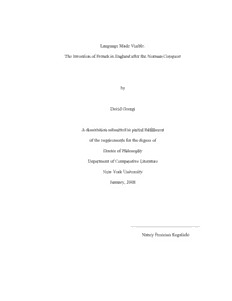
Language made visible: The invention of French in England after the Norman Conquest [PhD thesis] PDF
Preview Language made visible: The invention of French in England after the Norman Conquest [PhD thesis]
Language Made Visible: The Invention of French in England after the Norman Conquest by David Georgi A dissertation submitted in partial fulfillment of the requirements for the degree of Doctor of Philosophy Department of Comparative Literature New York University January, 2008 ______________________________ Nancy Freeman Regalado 3307998 Copyright 2008 by Georgi, David All rights reserved 3307998 2008 © David Georgi All Rights Reserved, 2008 “A fundamental question is whether the Norman Conquest helped develop French as a written language.” – Michael Clanchy From Memory to Written Record: England 1066-1307, 2nd ed. (Oxford: Blackwell, 1993), 215 Socrates: But let me next ask you this. What power do names have for us? What’s the good of them? – Plato, Cratylus DEDICATION To the memory of Sean Michael Collins (1965-2002) who did tell us, after all, that he would go first when somebody had to put his head on the block. iv ACKNOWLEDGEMENTS For their early gift of inspiring a love for words and history, for their endless generosity, and for their unfaltering presence as wise companions in my life, my first thanks are to my parents, Roger and Angela Georgi. My sisters, Mara and Karen, read long swaths of draft pages with their keen teachers’ eyes, and offered advice as welcome and sustaining as their perennial encouragement. My uncle, Michael Puglisi, allowed me displace him from the house in Vermont for more seasons than I like to admit, and that quiet space was a great help. In the matter of good working conditions, I also thank Lois Winnifred Georgi and Maruzza Accetta, though they are not with us in any easily explicable sense. Richard Sieburth first opened my eyes to the complexities and implications of translation, and over the years has offered sage counsel on a truly broad sweep of topics. If a dissertation were allowed to have a tutelary spirit or patron saint, this one’s is without doubt Nancy Freeman Regalado. When I came to her with this project, which was in a number of respects quite outside her usual sphere of expertise, she was willing to take it in, and she nurtured it from start to finish with inexhaustible patience and encouragement. Generous mentor and expert navigator, she permitted me an extraordinary degree of freedom, allowing the project to find its own direction; I mean it more than most when I say that the flaws and shortcomings of this dissertation are strictly my own. v Finally, last only because she arrived latest on the scene, Karmenlara Seidman breezed in from whatever enchanted land she is from, bringing insights and wisdom which made finishing this dissertation a harvest with bounties far greater and far different from the expected lessons in research, scholarship, and perseverance. vi ABSTRACT French literature, we now know, began in England not in France. The transformation of Old French from an oral vernacular to a language of written literature was perhaps the most momentous result of the collision of languages and cultures in England after the Norman Conquest. This paper seeks to add to our understanding of the event by tracing and analyzing changes in the way the Normans talked about, and conceived of, their vernacular tongue. At the same time, this medieval case study exposes crucial differences between medieval and modern ideas about the triangular relationship of language, nation, and state. The men who stepped off their boats in 1066 were Normans who spoke romanz; two generations later, when Norman men and women in England became the pioneers of Romance vernacular literature, it was as franceis who called their language franceis. The language itself had not changed appreciably, but their metalinguistic construct had. Back on the Continent romanz had been understood as a sprawling not-quite-Latin, spoken everywhere and associated with no particular group. The Anglo-Normans conceived of franceis as a distinct language, proper to their natio. Two methodological premises animate this study: dedication to explaining metalinguistic changes on the basis of textual evidence rather than vague notions such as ‘changing perspective’ or ‘English influence’; and recognition that vii medieval discourse on language and identity – even terms whose meanings we presume to be obvious, such as romanz, franceis and France – must be translated astutely across time if we are to avoid imposing anachronistic assumptions. A comparative approach, examining Old English evidence alongside Latin and French, reveals that the Normans’ shift in the way they defined themselves and their language involved directly translating English concepts and English words. The French language – not just the writing of it, but the very awareness of it as a language – was formed by contact and conflict, not in any center or capitol but out on the border, where confrontation with the Other leads to self-definition and invention. viii TABLE OF CONTENTS Dedication iv Acknowledgements v Abstract vii List of Abbreviated References xii Prologue 1 Introduction 3 1. Normans Identity and the Conquest of England 28 (cid:1) Norman identity before 1066 36 (cid:1) Norman identity after the Conquest: problems and positions 50 (cid:1) Reassessing the evidence 59 2. Writing a New Identity: Anglo-Norman Historiographical Texts after 1066 80 (cid:1) Franci in post-Conquest Anglo-Norman history writing 83 (cid:1) Franceis in the Anglo-Normans’ vernacular history writing 115 (cid:1) Conclusions from historiographical texts, c. 800-1135 124 ix
